Editors’ Note: U.S.-Israeli relations have taken a hit in recent years as the United States has become increasingly frustrated with the Netanyahu government’s lack of initiative on advancing a peace process with the Palestinians. Tamara Wittes examines the domestic Israeli and American trends poised to further strain relations if the countries’ leaders do not address these challenges head on. This article originally appeared in Haaretz on December 3, 2015—before the annual Saban Forum.
The past year brought unprecedented tensions in the U.S.-Israeli relationship, with many arguments and counterarguments about who is to blame. Beyond the tactical debates—about personality clashes, or the propriety of Israel parachuting into arguments between Congress and the U.S. president—are deeper challenges facing these two close allies. Last weekend, the Center for Middle East Policy at Brookings convened the Saban Forum in Washington to address these issues and to understand the future trajectory of the U.S.-Israeli relationship.
The first question that needs to be asked is why a bilateral relationship that for so long was kept above politics has now become a subject of bitter partisanship—in Israel, as well as in the United States. How did distasteful personal rhetoric become politically acceptable in a relationship that used to be carefully protected? Why did politicians lose their self-restraint about using the U.S.-Israel relationship as a wedge issue against their opponents? Why were opponents of the Iran nuclear deal, in Israel and in the United States, prepared to drag the American Jewish community and Democratic friends of Israel into the fray and force them to choose between supporting Israel and supporting their president?
Some argue that these trends result from differing levels of public support for Israel among Democratic and Republican voters. Polls show that Democratic voters are less supportive of the current Israeli government’s policies than Republican voters. If voters in the United States are splitting on partisan lines, the theory goes, then their elected representatives should follow. But polls that ask simplistic questions produce crude results.
A more detailed survey by my colleague Shibley Telhami shows us something deeper: the lenses Americans use to evaluate Israel’s conflict with the Palestinians have changed over time. Today, Americans increasingly look at the Israeli-Palestinian conflict through the lens of human rights—and this is especially true for younger Americans, African Americans and Hispanic Americans. This makes them sensitive to the suffering of Palestinian civilians, and to heavy handed Israeli counter-terrorism policies. These groups form a larger proportion of the voting public than they have in past, and a growing proportion of the Democratic Party’s core constituency. Likewise, American Evangelical Christians look at Israel through a lens of prophetic fulfillment, which combined with their conservative political preferences puts them squarely on the side of more hawkish Israeli policies. And Evangelicals are a core constituency for the Republican Party. These underlying changes in attitudes have shifted the calculus for American politicians. But that doesn’t mean a partisan split on “support for Israel” is inevitable. It does point to specific aspects of Israeli policy that affect how Israel is viewed. As American society becomes “majority-minority,” where no group, including Americans of European origin, constitutes a majority of the population, Israelis should keep these underlying lenses in mind.
[T]he lenses Americans use to evaluate Israel’s conflict with the Palestinians have changed over time.
A second issue to examine is Israelis’ combination of vulnerability and national pride. Even in a post-9/11 era, Americans have a hard time appreciating the sense of vulnerability and fear that Israelis face from ongoing terrorism and rocket fire. The Gaza War last year brought this vulnerability into sharp focus—the war went on longer than any in Israel’s history other than War of Independence, and the rocket threat affected most of the country’s civilian population. The large numbers of Palestinians killed and wounded led some in America to question Israeli tactics. U.S.-Israeli cooperation on Iron Dome produced impressive results and was trumpeted in the American media—but when you are walking outside and an air raid siren goes off, your faith in Iron Dome does not erase your sharp sense of fear.
Israelis’ sense of vulnerability is compounded by the asymmetric nature of the threats Israel is facing, and by the sense among many Israelis that their effort to reach a resolution of their conflict with the Palestinians has reached a dead end. The fear of another war and a sense that the neighborhood has turned deeply hostile, weigh heavily, in a way Americans have trouble understanding. Israelis become all the more anxious when they sense that their most important international ally might not see their security threats the same way they do.
Paradoxically, though, this sense of vulnerability coexists for Israelis with a sense of greater self-confidence about Israel’s military strength, its economic dynamism, and its wider relationships with the world. Particularly on the Israeli political right, there is today a stronger strain of nationalism and national pride (as evidenced in the “No Apologies” slogan of the Jewish Home Party in the last elections). In many countries around the world, including U.S. allies, the rise of right-wing nationalism is marked in part by politicians thumbing their nose at the global superpower: the United States. Israel, it appears, is no longer an exception to that rule.
Israelis become all the more anxious when they sense that their most important international ally might not see their security threats the same way they do.
These issues—Americans’ perceptions of Israeli policy toward the Palestinians, and Israelis’ combination of fear and self-confidence—go beyond the personalities of leaders or the choices of politicians. To bridge these gaps, the U.S.-Israel dialogue must reach beyond government meetings and Israel-Diaspora engagement— instead, Israelis and Americans must commit to understanding one another’s societies better than we do today.
Finally, and unavoidably, there is a policy problem driving U.S.-Israeli tensions—but it’s not what you might think. The Israeli and American governments are both struggling to deal with the disintegration of a twenty-year-old framework for settling the Israeli-Palestinian conflict. After the Oslo Declaration was signed in September, 1993, Americans, Israelis and Palestinians shared an approach to settling the conflict: direct bilateral negotiations mediated by the United States. But after the failure of the Kerry talks last spring, the two leaders in Jerusalem and Ramallah have no inclination to return to direct bilateral talks, and each of them in their own way emerged from the latest effort with questions about the role of the United States.
In the international community and the region, meanwhile, the loss of faith in the U.S.-led bilateral process has led to experiments with other modes of shaping the conflict, from economic pressure on Israel to new proposals for action by the UN Security Council. Netanyahu’s controversial words before Election Day last spring— that there would be no Palestinian state under his watch—were less of a unilateral declaration than a recognition of reality. The White House now more-or-less agrees, with Obama aides telling reporters that they did not expect peace on Obama’s watch. The longstanding, bilateral negotiating process was Washington’s main leverage in pushing back against other international efforts—and now that the negotiating process has ended, these efforts will inevitably escalate. Without U.S.-Israeli agreement on a way forward, further policy gaps are likely.
The Israeli and American governments are both struggling to deal with the disintegration of a twenty-year-old framework for settling the Israeli-Palestinian conflict.
This begs a question many American officials and analysts are asking: If there is no prospect for renewed bilateral talks toward a two-state solution, what is Israel’s Plan B? Does the Israeli government have a clear vision for its future relationship with the Palestinians? Israel expects American understanding as it takes steps it deems necessary to protect its citizens and ensure their future security. But American patience with Israel’s control over the West Bank is predicated on that control being temporary. There is impatience in Washington that Israel’s leadership has not tried to articulate a path forward beyond the immediate crisis—indeed, my colleague Natan Sachs argues that the current Israeli leadership has embraced “anti-solutionism” as a strategy. That’s a very difficult position for any American administration to support.
If their modern history is any guide, Israelis will not remain passive before the forces now reshaping the Middle East; instead, they will insist on charting their own path into the future. When Israelis finally do develop a clear view of their chosen road, their first stop to explain it and seek support will inevitably be Washington. But Washington may not wait forever—especially as the stalemate is generating sustained violence. The time is now to lay the foundations for that crucial policy discussion, by updating American and Israeli understandings of one another’s dynamic societies, and by building on the Saban Forum and similar platforms to enrich our bilateral dialogue.
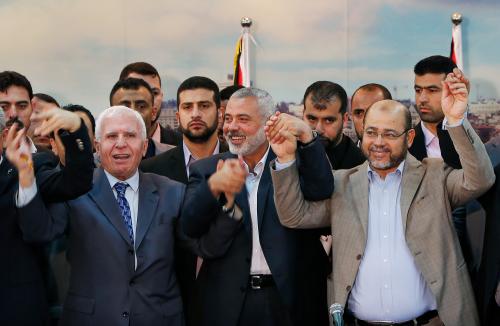

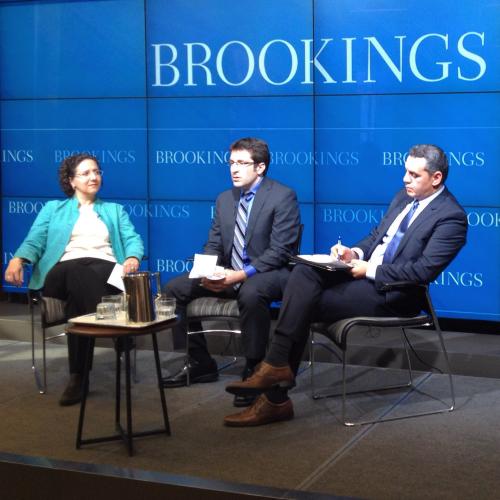

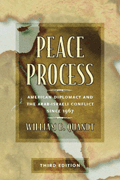


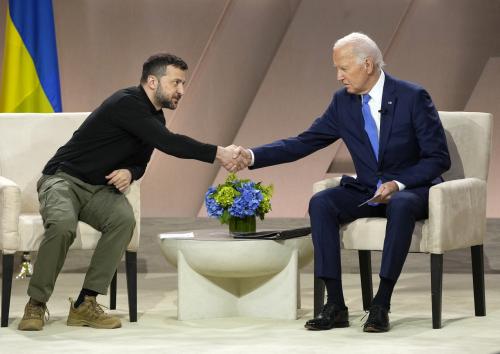
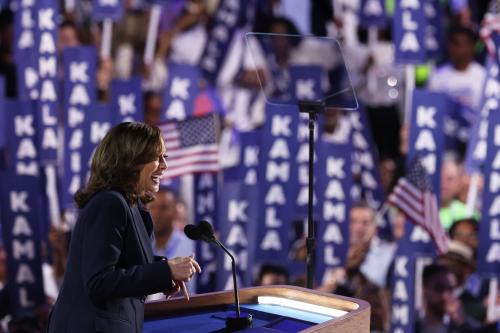
Commentary
Israel’s inertia on the Palestinian conflict has a price: American support
December 9, 2015